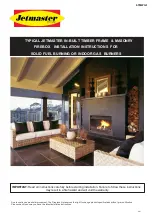
14
Heatilator • Birmingham 42-B Installation Manual • 4059-715 • Rev P • 09/28/15
3 ft min. from
top of uppermost
chimney section
to air inlet.
CAUTION! Risk of Cuts/Abrasions.
Wear protective
gloves and safety glasses during installation. Sheet metal
edges are sharp.
CAUTION! Risk of Fire or Asphyxiation! DO NOT
draw
outside combustion air from wall, floor or ceiling cavity, or
enclosed spaces such as an attic or garage.
•
DO NOT
place outside air inlet hood close to exhaust
vents or chimneys. Fumes or odor could be drawn into
the room through the fireplace.
• Locate outside air inlet hood to prevent blockage from
leaves, snow/ice, or other debris. Blockages could cause
combustion air starvation and unit overheat.
Figure 3.8 Outside Air Inlet Locations
Figure 3.9 Outside Air Installation
Outside air installed
on both sides (right
side not shown)
Outlet placed
higher than 3 ft
below the
termination cap
Attic space
Garage or
combustible
liquids storage
Outlet blocked by
snow, leaves, etc.
Clear area
outside
house or in
ventilated
crawl space
YES
NO
NO
NO
NO
Factory-built
fireplace
• Use UL181 Class 1 or Class 0 rigid or flexible ducting.
• Install with short run or mainly straight duct, except small
dip for cold air trap which will help prevent flow of cold air.
• Secure flex duct with screws or wire ties.
NOTICE:
The fireplace provides some outside air for
combustion. Other methods may be necessary if more air
is required.
• Cut a 6-1/2in. (165 mm) hole in outside wall to
accommodate air piping.
• Use 6 in. (152 mm) flex (not supplied) to directly connect
outside air to fireplace intake. Insulate the pipe to prevent
frost condensation.
• Use the supplied outside air inlet hoods.
• Seal between the wall and the pipe with silicone to
prevent moisture penetration and air leaks.
• Seal between the outside air inlet hoods and the house
with silicone to prevent air infiltration.
G. Outside Air Kit
Outside air kits must be used for combustion and to pro-
vide cooling air to prevent overheating. Hearth & Home
Technologies recommends you utilize the shortest duct run
to optimize the performance of the outside air kit. The out-
side air inlet hoods should be positioned in a manner that
will not allow snow, leaves, etc. to block the inlet. In some
installations the air duct may need to be run vertically. In
such an installation, a 3 ft (914 mm) height difference must
be maintained from the top of the uppermost chimney sec-
tion to the outside air inlet hoods.
Refer to Figures 3.8 and 3.9 when placing the outside air
inlets.
WARNING! Risk of Fire!
The outside air kits are installed
on the both sides of the fireplace to prevent overheating
and fire.















































